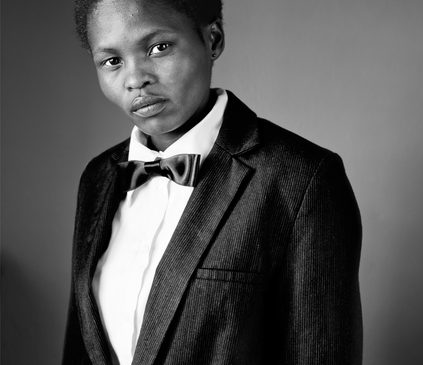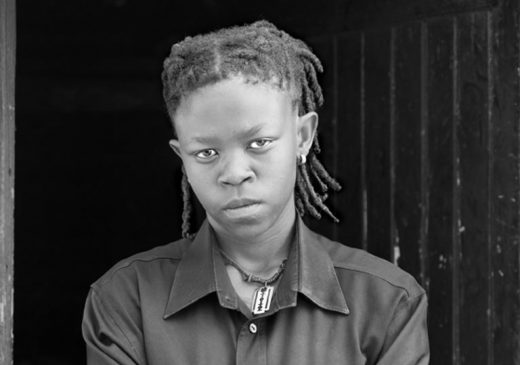
Zanele Muholi (artist)
About
“I didn’t see any images [at the time] that spoke to me as a black lesbian. At the height of the country’s transformation I needed to see myself, I needed to be counted, I needed to visualize how many of us look. I needed people to understand the ongoing challenges that we [faced] as a community.”
Zanele Muholi began their career as an activist, growing up in the Umzali township in Durban, on the east coast of South Africa. They enrolled in the Market Photo Workshop in Johannesburg, where they now reside, and helped co-found the organization Forum for the Empowerment of Women (FEW)—an LGBT- rights organization. In 2009 they completed an M.F.A. in Documentary Media at Ryerson University, Toronto. That same year, they founded the group Inkanysio (Zulu for “the one who brings light”), urging the youngest generation, born in the post-apartheid era, to be “the historians and archivists of their own lives, from reporting at ‘corrective rape’ murder trails to photographing baptisms.”2 They have won numerous awards, including the Fine Prize for an emerging artist at the 2013 Carnegie International; the Index of Censorship—Freedom of Expression Art Award (2013); and the Casa Africa award for best female photographer and a Fondation Blachère award at Les Rencontres de Bamako biennial of African photography (both 2009).
Muholi works with their subjects to craft the image, either in a studio setting or in the “wild,” allowing each person to choose their wardrobe, stance, and position. Some, like Bongiwe ‘Twana’ Kunene, Kwanele South, Katlehong, Johannesburg, 2012 present a sitter whose gaze is more confrontational; in comparison, Mbali Zulu, KwaThema, Springs, Johannesburg, 2010 and Amanda Mapuma, Vredehoek, Cape Town, 2011 are thoughtful and more vulnerable. The artist’s choice to use only black-and-white images is quite purposeful, as it was done to “create a sense of timelessness—a sense that we’ve been here before, but we’re looking at human beings who have never before had an opportunity to be seen.” They notes clearly, too, that their work does not represent the black queer community of other African countries, but just their native South Africa. With this series, they gives voices to the voiceless in South Africa. The portraits are forms of activism, gestures of defiance and the hope of self-acceptance by society.
By including Muholi’s works into the permanent collection of the NCMA the museum will be able to carry on the portrait sitter’s legacy. To quote Muholi once more: “the more you show the work, the more people from different backgrounds and places see it.” This exposure, the artist hopes, may help bring about further acceptance. Muholi captivates the viewer through their portraiture, and their activism has an impact both on a national and international basis. Indeed, this is still an ongoing need—and one that Muholi has experienced firsthand. In 2012, the artist’s apartment was ransacked by thieves, who stole over 20 hard drives which held thousands of images from Muholi’s archives. Such a crime suggests the continued controversy and unacceptance that their works aim to confront.

